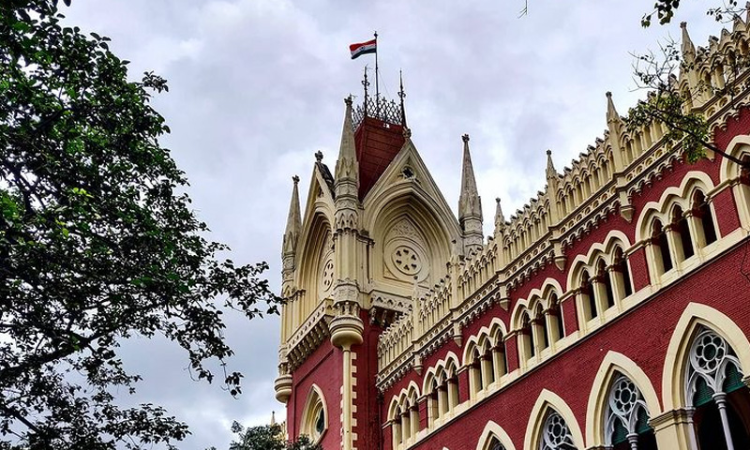- Home
- /
- High Courts
- /
- Calcutta High Court
- /
- No Change Can Be Made To Essential...
No Change Can Be Made To Essential Qualifications After Recruitment Process Starts: Calcutta High Court
Udai Yashvir Singh
5 May 2024 2:45 PM GMT
A single judge bench of the Calcutta High Court comprising of Justice Partha Sarathi Chatterjee while deciding a Writ Petition in the case of Animesh Singha Mahapatra and Ors. vs State of WB and Ors. has held that once the process of recruitment starts, no change can be made to essential qualification during the subsistence of the recruitment process unless such power is reserved in...
A single judge bench of the Calcutta High Court comprising of Justice Partha Sarathi Chatterjee while deciding a Writ Petition in the case of Animesh Singha Mahapatra and Ors. vs State of WB and Ors. has held that once the process of recruitment starts, no change can be made to essential qualification during the subsistence of the recruitment process unless such power is reserved in the advertisement itself or under some rule governing the recruitment.
Background Facts
Selection process under the 12th Regional Level Selection Test (RLST) was undertaken by the West Bengal Central School Service Commission (Commission) to fill up various posts of Assistant Teachers in West Bengal and an advertisement regarding the same was issued on 29.12.2011 for inviting eligible and interested candidates.
The Petitioners were not able to get selected in the final merit list. However, it came to light that in the 450th meeting of the Commission dated 06.06.2013, a resolution was passed by which no academic score was added to the marks of person having a “D.EL.Ed” or a degree from Primary Teachers' Training Institute (PTTI) and certificates of one year's “Bridge Course”. Due to the aforesaid resolution, no marks were awarded to the Petitioners against their training qualifications. Thus, the writ petition was filed.
It was contended by the Petitioners that as per the advertisement dated 23.12.2011, training qualifications for both the “pass category” and “honours vacancy” were the same. The advertisement prescribes the qualification of “B.A./B.Sc./B.Com from any UGC recognized University having concerned subject as combination subject of at least 300 marks and 2 year diploma in Elementary Education (by whatever name known)” for the post of Assistant Teacher in pass category. Since the Petitioners completed one year's Bridge Course from National Council of Teacher Education (NCTE) recognized institutions, they acquired the desired qualifications prescribed in the aforesaid advertisement as Primary Teachers' Training along with one year Bridge course is equivalent to 2 years' D.El. Ed Course.
On the other hand, it was contended by the Commission the candidates under the honours category require an essential training qualification of B.Ed. and candidates who underwent Primary Teachers' Training along with one year Bridge course are not entitled to be treated at par with people having B.Ed degree.
Findings of the Court
The court observed that usually, the policy decisions by the state/employer related to qualification with respect to a particular post are reflected in the advertisements issued regarding that post. The court further held that it is a settled proposition of law that when the advertisement expressly states that selection would be conducted in accordance with certain rules then the selection must be made in strict consonance with those rules
The court further observed that on combined reading of various notifications and the provisions of the advertisement dated 29.12.2011, it followed that all Petitioners who offered their candidature for the post under “pass category” having PTTI training (one year) and completed one year Bridge Course from NCTE recognised training institution shall be treated as a candidate having degree of 2 years' D.El.Ed. and they were entitled to get 6 marks.
The court further held that once the process of recruitment starts by issuance of an advertisement, no change in the essential qualification can be made during the subsistence of the recruitment unless such power is reserved in the advertisement itself or any other rule governing the recruitment. Thus the action of the Commission to pass a resolution in their 450th meeting to not treat D.El.Ed at par with B.Ed run counter to the terms and conditions of the advertisement and cannot be sustained.
The court further held that the clauses of the advertisements have the trappings of statutory prescriptions
With the aforesaid observations, the court disposed of the writ petition.
Case No.- WPA 20897 of 2013
Case Name- Animesh Singha Mahapatra and Ors. vs State of WB and Ors
Counsel for the Petitioner- Mr. Sukanta Chakraborty Mr. Sakabda Roy, Mr. Roumyadip Saha
Counsel for Respondents- Mr. Biswabrata Basu Mallick, Mr. Sayak Chakraborty. Mr. Kanak Kiran Bandyapadhyay


